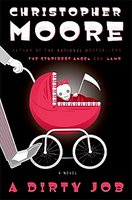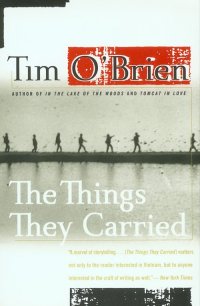 Well, I finished Never Let Me Go, by Kazuo Ishiguro, yesterday. I have to say, I was pretty disappointed. I wanted another side of this story. I wanted social turmoil, discrimination, and ruthlessness. That was all there, but it remained hidden in the background until the last pages of the book.
Well, I finished Never Let Me Go, by Kazuo Ishiguro, yesterday. I have to say, I was pretty disappointed. I wanted another side of this story. I wanted social turmoil, discrimination, and ruthlessness. That was all there, but it remained hidden in the background until the last pages of the book.
What I got was a coming-of-age story about cloned children in a boarding school. By the end, it's revealed that the clones are created from prostitutes and homeless people. Their only purpose is to host organs to be donated to real humans (who then use these organs to cure diseases like cancer). The school where our characters reside is an 'experiment'. The teachers (or guardians, as they're called) believe that clones have souls and would benefit from actual education. We see that the clones really do have souls, because our first person narrator is one of these clones.
But do we really see 'souls'? Sure, we learn they have emotions and dreams. But our characters, at least, are also annoying, childish, and unlikeable. Their grasp of abstract concepts seems very weak. Love in particular seems to elude them, even though they develop relationships and have sex.
So the big question that finally comes around at the end is: is it cruel to raise these clones only to kill them in the end? Do we have the right to control their lives just because we created them?
Great questions. But they are questions that only come with the knowledge we receive at the end of the book. Our interest is (supposed to be) with the main characters of the book: clones who were priviliged and had almost no knowledge of the way they were viewed by the outside world.
In short, Battlestar does it much better. Though the implications and consequences are different, th ey ask the questions and keep you asking. I found the book boring and sophomoric. All the more so, because there is a great story BEHIND everything that happens in the book. I understand Ishiguro did that for a reason. But it's just not the kind of book I want to read.
ey ask the questions and keep you asking. I found the book boring and sophomoric. All the more so, because there is a great story BEHIND everything that happens in the book. I understand Ishiguro did that for a reason. But it's just not the kind of book I want to read.
Next up: Survivor, by Chuck Palahniuk. A hijacker is alone in the air on the airplane he hijacked, speaking into the black box, telling his story. It's my first Palahniuk book, and I already love it.
Saturday, October 28, 2006
BCOO: Never Let Me Go
Friday, October 27, 2006
Bonne et heureuse semaine
DISCLAIMER:
If anyone has an *irrational* problem reading about the curse/my old Aunt Flo/the time when a woman's body flushes itself out, feel free to skip this entry. (I'll be peppering the rest of the entry with other absurd euphemisms. Yes, they're all real - except for that last one. I made that up.) However, the main point of this post is feminine PRODUCTS, so don't run screaming yet.
I wear tampons during the day when I'm rebooting the ovarian operating system. Though I have a serious problem with the fact that I'm sticking a bleached product into myself for hours at a time, it's the best solution I can find. But at night, I use pads. I don't want the tampon in there for more than four hours and on a good day, I sleep longer than that. Who am I kidding I ALWAYS sleep longer than that.
Anyway, a couple o f nights ago I opened a new package of the Always pads I use - the ones with wings on the sides. The wings are held together with a piece of paper, which you take off when you open it. That paper greets me with, "HAVE A HAPPY PERIOD!!!" It is then followed by the mandatory French translation I used as the title of this post.
f nights ago I opened a new package of the Always pads I use - the ones with wings on the sides. The wings are held together with a piece of paper, which you take off when you open it. That paper greets me with, "HAVE A HAPPY PERIOD!!!" It is then followed by the mandatory French translation I used as the title of this post.
(Tangent: why do most women's products have a French translation? Shampoo, make-up, tampons, pads - everything written on these products is written in both English and French. Is it only to appear posh and 'international'? If anyone knows a better reason, please enlighten me. Granted, sometimes there is a Spanish translation too, but many people in the US speak Spanish.)
This new little addition to my night-time routine gave me pause. I think I may have actually chortled. First of all, no one has a happy T-Minus 9 months and holding. Though I have been blessed with little pain and suffering during arts and crafts week at panty camp. No one has a 'happy', pleasant, or nice dishonorable discharge from the uterine navy. NO ONE. Not even the freest spirit, the hairiest, smelliest woman, the Wicca-est priestess. No one enjoys their time ordering l'omelette rouge.
The companies that make feminine products are seedy and manipulative and I'm one of their victims. I know this, yet continue to buy their products. Someone told me yesterday (we both doubted its veracity) that Tampax is being investigated for adding an addictive ingredient to their tampons. Regardless of the truth of that rumor, Tampax does conveniently forget to add bleach to their list of ingredients.
The point is, I don't want them wishing me 'a happy period'. It doesn't make me think (as I imagine their trying to) that I'm at a slumber party with a couple of my closest girlfriends. Right after our pillow fight, we start talking about how stupid it is that we complain about playing the banjo in Sgt. Zygote's Ragtime Band so much. Let's empower ourselves! Let's have HAPPY massacres at the Y! We should always be happy, right? Guys don't like it when we complain. Who cares that our insides are trying to punch through our stomach while simultaneously clenching and spinning? Who cares that we have headaches and backaches? Who cares that we have blood flowing continuously out of ourselves? Guys have to walk around with penises dangling around ALL THE TIME. We should feel sorry for them and their fragile ball sacs.
Okay. Sorry. The inner militant feminist does break out sometimes, doesn't she? The point is, saddling Old Rusty is not fun. Taking Carrie to the prom is not empowering. They're disgusting. There are times that you feel like a little child/old woman who can't control what is released down there. Ah - there's the worst part. You are not in control. For a week out of every month. A woman cannot control or predict (much) what her body will do or feel like. She feels helpless at times and ridiculous at others.
So let us be miserable. I'm not saying we should complain about them or use them as an excuse to be lazy or unproductive. But don't wish us "happy periods." It's offensive and presumptuous. Let us deal with it the way we've learned to, whether it's with chocolate or exercise. Please, just wish me a young menopause.
And let's stop with the euphemisms. A period is a period. Period. Miss Scarlet is not coming home to Tara. It is not game day at the crimson tide. I am not trolling for vampires. I am on my period. And I can feel blah. I can feel vaguely out of sorts. I don't have to take it out on anyone, but I don't have to put on a smiling face for anyone either.
Thank you, and let's keep those panty shields up, captain.
Friday, October 20, 2006
BCOO: A Dirty Job
I know - the acronym doesn't work very well. But I was annoying myself by my repetition of the 'too cute' Book Club of One. BCOO - talk about too cute. But here it is. And I'm sticking with it. For now, anyway.
So this pa rticular BCOO is about A Dirty Job, by Christopher Moore. For any of you planning to read the book, while I don't think I give too much away, I do give a brief summary with no actual details as to how things end up. Just a little warning.
rticular BCOO is about A Dirty Job, by Christopher Moore. For any of you planning to read the book, while I don't think I give too much away, I do give a brief summary with no actual details as to how things end up. Just a little warning.
I discovered Moore when I was visiting Jason in New Hampshire. The first book I read of his was Lamb: The Gospel According to Biff, Christ's Childhood Pal, which is still my favorite. Lately I've been enjoying him less, which is perplexing.
A Dirty Job is about a man who, shortly after his wife's death, discovers that he is what the book comes to refer to as a Death Merchant. Basically, Charlie can see red glowing auras around certain objects: necklaces, CDs, umbrellas, a fur coat, etc. These are 'soul vessels' which Charlie must obtain after a person has died. Charlie then puts the item up for sale in his shop and the vessels transfer to a new person who does not yet have a soul.
That's the jist. There's a lot more actual plot, but that's the premise. If Charlie (and the other Death Merchants) do not obtain the soul vessel, bad things happen.
I enjoyed the book, but I found a lot of holes in the plot and characters. I don't know if I've changed or Moore's writing has. (Jason says it's me.) Moore's novels are comic and fun, and I love that. But sometimes the comedy seems forced. It seems to take away from the novel. Some of the characters, for example, will come out with something extremely funny. Yet it feels out of place for that particular character or for that particular time. I guess my main beef is that it takes me out of the reality of the story and puts me at a distance. I can hear the author there. And I don't want to. That's it: it doesn't seem realistic at those moments.
Mind you, this is a book with fantastical elements. Hell, what am I dancing around? It's a book that belongs firmly in the fantasy genre. But the reason I love Harry Potter (the only other pure fantasy novel I've read) is because it all seems so real. I love that. I don't want to be reminded that I'm reading a novel.
While I'm looking for a quote to back myself up, however, I keep finding some great lines:
"It's okay, Ray. But I really have to go. You know, fighting the Forces of Darkness and all." Charlie held his cane out as if it were a sword and he was charging into action, which, bizarrely, it was and he was.Well, there you go. Not a glowing recommendation, but a fun, effortless read nonetheless. That's definitely not a negative. I like fun reads. If you have some spare time and want some
Everyone is happier if they have someone to look down on, as well as someone to look up to, especially if they resent both. This is not only the Beta Male strategy for survival, but the basis for capitalism, democracy, and most religions.
 laughs and some not-so-hidden pathos, have at it. But make sure you read Lamb as well.
laughs and some not-so-hidden pathos, have at it. But make sure you read Lamb as well.Next up: a Japanese novelist's take on cloning, Never Let Me Go, by Kazuo Ishiguro.
Thursday, October 12, 2006
Book Club of One: The Things They Carried

I know, it's fast. But I told you I was well into it.
This book is amazing (the link takes you to a great article on Wikipedia about the book). I'm not sure exactly how to put it into words. It's one of those few books in which every word, every sentence is completely and utterly true (hence the 'faction') I mentioned in the earlier post. The book is a series of vignettes about and hovering around Tim O'Brien's experience in the Vietnam War. The details of his conflicting ideas and emotions, the people around him, the insanity, the environment, the desperation are delivered in such a way as to make you rub your face, thinking there's a foreign Vietnamese insect on your face. This book is passionate, honest, revealing, and naked. It's beautiful, horrifying, and crazy. It's all the other adjectives you can think of. It's a true work of art.
Here are some quotes derived from the many dog-eared pages:
They used a hard vocabulary to contain the terrible softness...It wasn't cruelty, just stage presence. When someone died, it wasn't quite dying, because in a curious way it seemed scripted, and because they had their lines mostly memorized, irony mixed with tragedy, and because they called it by other names, as if to encyst and destroy the reality of death itself.
They were too frig htened to be cowards.
htened to be cowards.
It was my view then, and still is, that you don't make war without knowing why.
You can tell a true war story if it embarrasses you. If you don't care for obscenity, you don't care for the truth; if you don't care for the truth, watch how you vote. Send guys to war, they come home talking dirty.
And on returning after the war:The town seemed remote somehow. Sally was married and Max was drowned and his father was at home watching baseball on national TV....Norman Bowker shrugged. "No problem," he murmured.
One last quote:
I want you to feel what I felt. I want you to know why story-truth is truer sometimes than happening-truth.
I know, I went a little overboard with the quotes. But I adored this book and I hope I'll get at least one person excited about reading it.
Wednesday, October 11, 2006
Why Bush Can't Say "Nuclear"
Okay, I don't really know why. I have some theories: he's an idiot, he's from Texas, he's an idiot...I'm not sure. I just thought it would be a funny title.
This week, a great podcast from NPR, Justice Talking, focuses on nuclear disarmament and non-proliferation. It is fascinating and worth a listen to. I had forgotten much of what was addressed in the discussion.
and non-proliferation. It is fascinating and worth a listen to. I had forgotten much of what was addressed in the discussion.
We all know that there are many countries with nuclear bombs. The majority are left over from the Cold War, but some, like India, Pakistan, and (even though they won't admit it) Israel have armed themselves after the Nuclear Non-Proliferation Treaty was signed. (The treaty prevents the spread of nuclear weapons.) North Korea did sign the treaty but has since withdrawn.
Jason and I have had many great discussions about America's hypocrisy in condemning nuclear testing and the building of bombs. Though the treaty did not stipulate disarmament, there was a provision for a later treaty detailing disarmament policies.
We still have bombs (5,735 active warheads), China has bombs, Russia has bombs. It's a 'club'. (Also including the UK, France, and now North Korea.) So how can we blame other nations for building and testing nuclear bombs? They want to have the capability to blow us off of the face of the earth because we have the capability. I understand it.
According to the podcast, we still have bombs pointed at Russia that would be ready to go within 15 minutes of the President's decision (his go ahead is the only approval needed). What the hell!? Russia isn't even an enemy anymore.
The truth is, nuclear bombs don't do anyone any good. This isn't idealistic Amanda talking here. She's pretty much gone these days. I mean, who are we going to bomb? If we bomb any country with a nuclear bomb, we are assured an immediate retaliation. It would be suicide. If we bomb a country without a nuclear bomb, we're unjustified, cruel executioners. Defense? Doesn't sound like a g ood defense strategy to me.
ood defense strategy to me.
So maybe Bush isn't an idiot. Maybe he says "nucular" because he thinks its folksy. He wants to show the lighter side of destruction and violence. If he says "nucular," we'll pay more attention to his idiocy than to the fact that we still have nuclear bombs set on a hair-trigger.
Of course, when he decided we should go to war in order to stop supposed nuclear armament, the ingenious Karl Rove and his minions decided they should go with the pseudonym "weapons of mass destruction." The word (or words) used for THE supposed reason for war cannot be a word that causes derision. They're brilliant, I tell you!
Monday, October 09, 2006
Book Club: A Widow for One Year
I finished this book awhile ago, and am well into my next *amazing* book,The Things They Carried, by Tim O'Brien. O'Brien is a Vietnam War veteran who has written several books about the war and several books on other subjects. This one is the former. As one of the reviewers says, this is a book of 'faction'. Though it claims to be entirely fiction (supported by one of the essays/stories in the book in which O'Brien dissects a true war story). However, the book is dedicated "the men of Alpha Company, and in particular..." and he lists the names of men who are "characters" in the book. O'Brien uses himself as well. So though this is a work of fiction, it is probably the most personal, honest work of fiction I've ever seen. I'm about half-way through and I'm in love.
But this is suppos ed to be a discussion of A Widow for One Year, by John Irving. The book is divided into three parts: Summer 1958, Fall 1990, and Fall 1995. It follows a family of writer's, The Coles and the people who surround them. Irving calls this novel "a love story" in his dedication at the beginning of the book. The story involves all kinds of love: friendship, family, sex, dating, and the prospect of finding a mate for life. But the book deals mostly (in its best parts, in my opinion) with love lost, misguided love, misrepresented love, and doomed love. The first part does this best, in my opinion. And it was the only part of the book that kept me involved in the way I expected after reading The World According to Garp.
ed to be a discussion of A Widow for One Year, by John Irving. The book is divided into three parts: Summer 1958, Fall 1990, and Fall 1995. It follows a family of writer's, The Coles and the people who surround them. Irving calls this novel "a love story" in his dedication at the beginning of the book. The story involves all kinds of love: friendship, family, sex, dating, and the prospect of finding a mate for life. But the book deals mostly (in its best parts, in my opinion) with love lost, misguided love, misrepresented love, and doomed love. The first part does this best, in my opinion. And it was the only part of the book that kept me involved in the way I expected after reading The World According to Garp.
Don't get me wrong. I still love John Irving. He can build a character in one word and many of his sentences are pregnant pause-worthy. I always know I'm going to disappear into an Irving novel. But some of the relationships in this novel just didn't ring true (I'm thinking especially of Ruth Cole and her best friend, Hannah). And I didn't buy Ruth Cole herself a lot of the time. It's not that Irving has trouble writing women: his skill with Marion in the first part is evidence to the contrary. But Ruth has a few holes and some inconsistencies (again, my opinion).
The first part, also, has the strongest images in the novel. The pictures, the hooks, the drawings, the children's books, the setting. It all really came together for me in the first part. This is the part that the movie: "The Door in the Floor" is based on.
Part of my problem with the second and third parts is that I was reading about writers who I would never read. Ruth Cole is supposedly a very famous writer, but the excerpts from her novels struck me as sophomoric and repetitive. Okay, I get the point - look at John Grisham, right? But I was bored and impatient when I had to sit there and read the fictional authors' work. Unlike in The World...Garp, where I could see the growth and beauty in Garp through his work, the work of the authors in the novel only made me think less of him. Except, of course, for Ted Cole, Ruth's father who writes children's books in the first part.
So there's a quicky little review. I will read Irving again. I'd like to try all of his books. He interests me, even though I know he's popular. I love his characters, and characters are what excite me when I read.
Sunday, October 01, 2006
A Response to ... No One
I have a bone to pick. I picked the bone up over at Broadsheet (yep - I can't get enough of those writers over there). This article, posted on 9/27, was about a convention outside of Chicago entitled "Contraception is Not the Answer." Here's my bone:
"As the Chicago Tribune reports, 'Experts at the gathering assailed contraception on the grounds that it devalues children, harms relationships between men and women, promotes sexual promiscuity and leads to falling birth rates, among social ills.' (Who says we can't have it all?)."
Also, "according to Joseph Scheidler, head of conference sponsor the Pro-Life Action
League: 'Contraception is more the root cause of abortion than anything
else.'"
Alright, let me hit all the points. I'll skip the big one.
Birth Control:
-devalues children; I'm assuming the argument is that, in using contraception, a woman (or man) is killing a potential life. This argument is entirely based on a set of beliefs that I don't have, namely, that all potential life is sacred, that an unborn, un-thought-of, unfertilized 'child' should come before a living, breathing, rational being. In this argument, the woman's eggs and the man's sperm cease to become private property and the person who 'owns' the eggs/sperm does not have any say in their use.
-harms relationships; I have no idea what this argument means. Does it harm relationships because there are no kids for whom the couple feels obligated to stay together? Does anyone understand?
-skipping-
-leads to falling birth rates; maybe, or falling abortion rates - a good thing on all sides. This argument is beginning to be utilized by pro-life organizations. They are becoming pro-contraception (or, as Scheidler calls them, "contraception buffs") because they believe (accurately) that greater contraception usage will lead to less unwanted pregnancies, which will lead to a decrease in the number of abortions. And everyone (no matter what people who call us 'pro-abortion' might think) would love a decrease in abortions. It isn't pleasant for anyone to have to go through. Falling birth rates would also lead to less poverty, decreased population, and less unwanted children waiting to be adopted. Because guess what? People who use contraception DON'T WANT TO GET PREGNANT!!!
-contraception is largely the root cause of abortion; I don't think even merits discussion. What was he thinking?
Okay, back to the promiscuity argument. This is the big bone (yeah, yeah - ha ha) I've been waiting to pick at. This argument is used for contraception, Plan B, RU-486(the abortion pill), and abortion itself. These will all, according to some, lead to sexual promiscuity!!! No! Please! Think of the children!
This assumes that women are unable to control themselves, waiting for anything that will allow them to take anything they can get. Women are sexual creatures, unable to check their desires. They think: "If I won't get pregnant, that means I should have sex whenever and wherever I can! Yahoo!" And while this may be a nice fantasy for some of the men who run these 'organizations' it is not the truth.
Women come in all different types and contain all levels of intelligence, just like men. I know! It's crazy, right? Some women make bad decisions, others make impulsive decisions. Still others wait too long and never grab the chance to make a decision.
If women make a (in my opinion) bad decision to sleep with someone they don't know or don't trust, they are also capable of making the decision to have sex *without* birth control. There are many women who are scared to ask guys to use a condom. While this is RIDICULOUSLY stupid, as it puts women at risk for countless sexual diseases, wouldn't it be better if this woman, who makes bad decisions, to NOT have a child? Why don't we throw her a bone and give her a little birth control so that the next time she has unprotected sex and contracts HIV, she won't give the infection to the fertilized egg cropping up a week later. Again, let her bad decision be HERS. Wouldn't it be better if her bad decisions affected only herself?
I went on a tangent, I know. Please, ladies, use condoms AND birth control.
My point? Birth control does not change a woman's choice. A woman who is prone to bad decisions will continue to make them, and it would be better if those decisions (and the effects of them) were not passed to a child.
My main problem with this argument is the assumption mentioned above. Women cannot take care of themselves, cannot be trusted to take control of their own bodies, their own existence. So why do they want these poor, helpless, wimpy women to have babies? If we can't make decisions for ourselves, how can we raise a child?